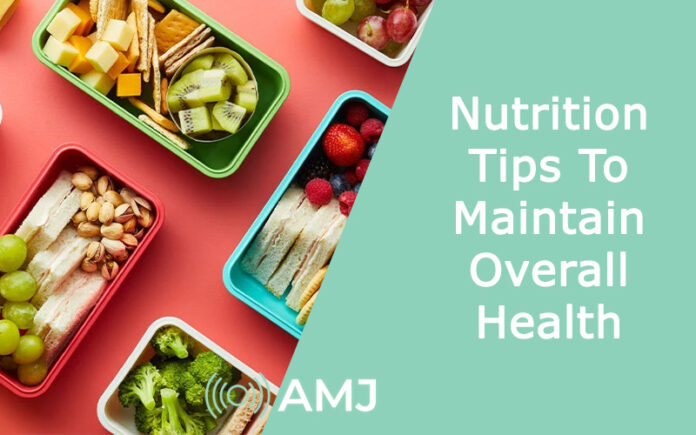The food consumed by us on a daily basis provides our body with the essential nutrients it requires to function properly. There are various aspects of your overall health that are directly impacted by the kind of food you eat. Some of the important bodily functions and processes you should know to maintain overall health include:
Contents
1. Joint/ Bone Health
It is important to maintain optimal health and functioning of your bones and joints. When you reach the age of 30, your bones reach their peak mass and health. This is when you become more vulnerable to the development of bone-related conditions such as osteoporosis.
To maintain joint and bone health, ensure that your diet has calcium rich foods such as dairy products, soy products, almonds, broccoli, and so on. You can also rely on capsules and tablets for joint pain.
In addition to calcium, vitamin D is also an important nutrient for healthy bones and joints. It also aids better absorption of calcium in the body. You can consume eggs, mushrooms, certain fish (such as tuna, salmon, trout, etc.), and fortified foods to fulfil your body’s vitamin D requirements.
2. Eye Health
Now let’s discuss some of the important nutrients for the maintenance of optimal vision and healthy eyes. Nutrients like omega 3 fatty acids, vitamin A, vitamin C, and vitamin E are excellent for the maintenance of healthy eyesight and prevention of age-related degeneration.
You can rely on walnuts, flaxseeds, fish, oysters, etc. to meet your body’s omega 3 requirements. If you are unable to get enough amounts of omega 3 through natural foods alone, you can opt for omega 3 capsules. Citrus fruits, strawberries and kiwi can be excellent sources of vitamin C. You can get enough amounts of vitamin A from sweet potatoes, carrots, spinach, etc. Nuts and legumes, eggs, seeds, and so on can provide you with the required amounts of vitamin E.
Did You Know? Carrots contain a pigment called beta-carotene that is known for its ability to promote eye health. It also reduces the risk of diseases including cataract and age-related macular degeneration.
3. Dental Health
After discussing nutrition tips for joint health and bone health, we come to dental health. Calcium and vitamin D are important nutrients that not only support healthy bones but also help maintain healthy teeth. Phosphorus is another nutrient that works with calcium to maintain healthy teeth. Vitamin C is good for gum health, and vitamin A helps maintain healthy tooth enamel and prevents cavities.
Phosphorus can be found in foods like dairy products, eggs, poultry, fish, meat, and so on. In addition to the consumption of these nutrients, you can limit the consumption of acidic or sugary foods and beverages that may lead to tooth decay/ erosion.
4. Digestive Health
Your digestive system helps your body breakdown the food it consumes into nutrients that it requires to function on a daily basis. Healthy gut microbiomes can also help with the prevention of conditions like diabetes, obesity, and some chronic illnesses. Fibre, probiotics, and prebiotics are the major nutrients that can help maintain a healthy digestive system.
Fibre helps maintain proper bowel movement, and can be found in foods including whole grains, vegetables, fruits, nuts, etc. Probiotics are healthy gut bacteria that play a key role in digestion. These can be found in fermented foods such as yoghurt. Prebiotics can be defined as a type of indigestible fibre that promotes the growth of probiotics. These can be availed through bananas, onions, oats, garlic, and so on.
5. Mental Health and Brain Function
So far, all nutrients we have discussed are beneficial for your physical health. B vitamins, omega 3, magnesium, zinc, and vitamin D help with the maintenance of your mental health as well as healthy brain function.
Omega 3 fatty acids are linked with enhanced mood as well as reduction in depression and anxiety. B vitamins help regulate mood and brain function, and can be availed through whole grains, eggs, poultry, fish, meats, etc. Magnesium and zinc can help reduce the symptoms of anxiety. Leafy greens, whole grains, nuts, seeds, etc. are great sources of magnesium; zinc can be availed through oysters and fortified products.
Conclusion
The bottom line is that every individual should focus on joint and bone health, eye health, dental health, digestive health, and mental health among other functions in order to remain healthy. You can focus on the inclusion of the discussed nutrients in your daily diet. You can also speak to a certified nutritionist for a customised diet plan.












![Index of Money Heist [Season 1, 2, 3 & 4 – All Episodes, Cast and Plot] Index of Money Heist](https://www.asiamediajournal.com/wp-content/uploads/2021/05/Index-of-Money-Heist-3-100x70.jpg)